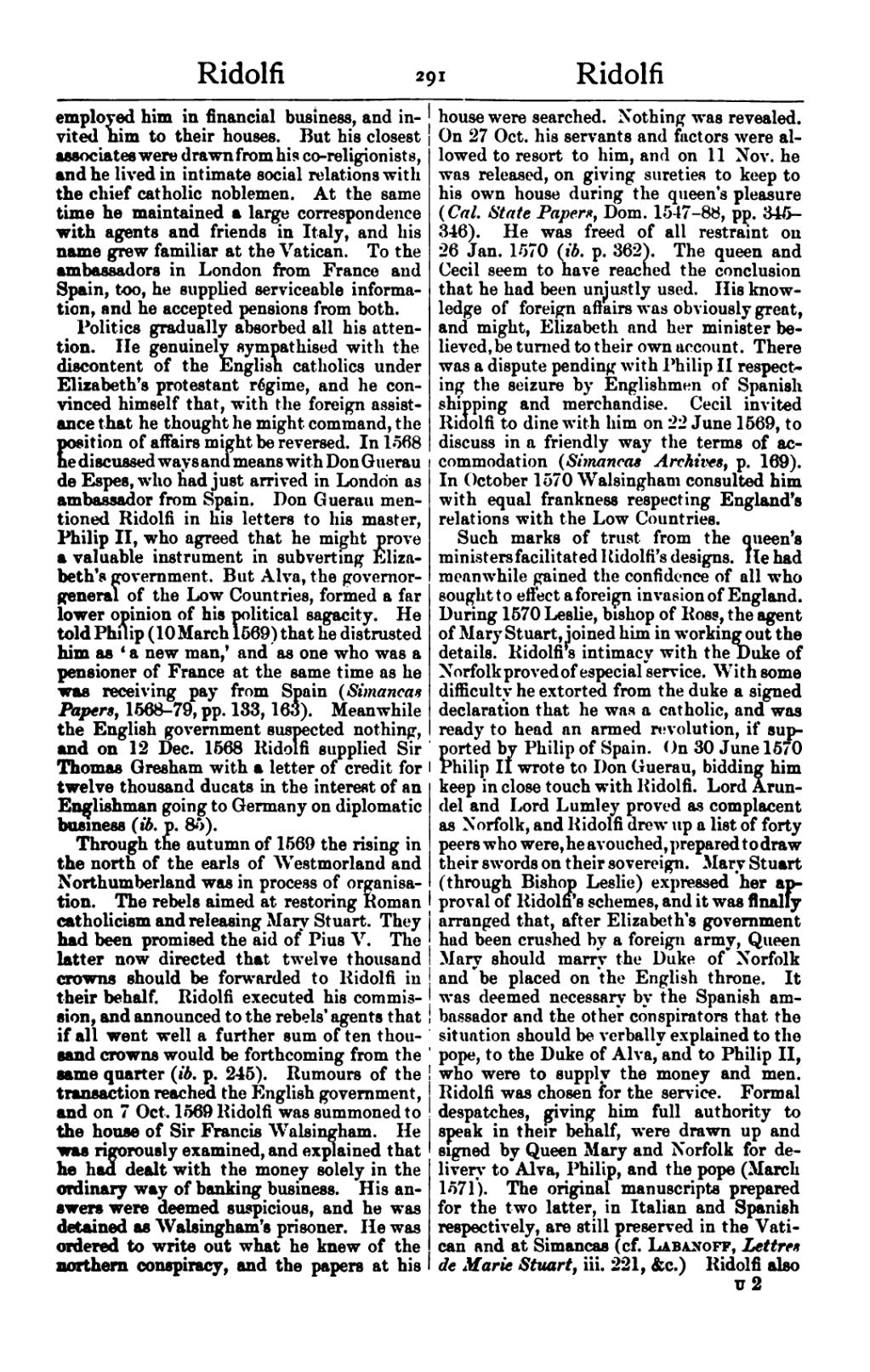employed him in financial business, and invited him to their houses. But his closest associates were drawn from his co-religionists, and he lived in intimate social relations with the chief catholic noblemen. At the same time he maintained a large correspondence with agents and friends in Italy, and his name grew familiar at the Vatican. To the ambassadors in London from France and Spain, too, he supplied serviceable information, and he accepted pensions from both.
Politics gradually absorbed all his attention. He genuinely sympathised with the discontent of the English catholics under Elizabeth's protestant régime, and he convinced himself that, with the foreign assistance that he thought he might command, the position of affairs might be reversed. In 1568 he discussed ways and means with Don Guerau de Espes, who had just arrived in London as ambassador from Spain. Don Guerau mentioned Ridolfi in his letters to his master, Philip II, who agreed that he might prove a valuable instrument in subverting Elizabeth's government. But Alva, the governor-general of the Low Countries, formed a far lower opinion of his political sagacity. He told Philip (10 March 1569) that he distrusted him as ‘a new man,’ and as one who was a pensioner of France at the same time as he was receiving pay from Spain (Simancas Papers, 1568–79, pp. 133, 163). Meanwhile the English government suspected nothing, and on 12 Dec. 1568 Ridolfi supplied Sir Thomas Gresham with a letter of credit for twelve thousand ducats in the interest of an Englishman going to Germany on diplomatic business (ib. p. 85).
Through the autumn of 1569 the rising in the north of the earls of Westmorland and Northumberland was in process of organisation. The rebels aimed at restoring Roman catholicism and releasing Mary Stuart. They had been promised the aid of Pius V. The latter now directed that twelve thousand crowns should be forwarded to Ridolfi in their behalf. Ridolfi executed his commission, and announced to the rebels' agents that if all went well a further sum of ten thousand crowns would be forthcoming from the same quarter (ib. p. 245). Rumours of the transaction reached the English government, and on 7 Oct. 1569 Ridolfi was summoned to the house of Sir Francis Walsingham. He was rigorously examined, and explained that he had dealt with the money solely in the ordinary way of banking business. His answers were deemed suspicious, and he was detained as Walsingham's prisoner. He was ordered to write out what he knew of the northern conspiracy, and the papers at his house were searched. Nothing was revealed. On 27 Oct. his servants and factors were allowed to resort to him, and on 11 Nov. he was released, on giving sureties to keep to his own house during the queen's pleasure (Cal. State Papers, Dom. 1547–88, pp. 345–346). He was freed of all restraint on 26 Jan. 1570 (ib. p. 362). The queen and Cecil seem to have reached the conclusion that he had been unjustly used. His knowledge of foreign affairs was obviously great, and might, Elizabeth and her minister believed, be turned to their own account. There was a dispute pending with Philip II respecting the seizure by Englishmen of Spanish shipping and merchandise. Cecil invited Ridolfi to dine with him on 22 June 1569, to discuss in a friendly way the terms of accommodation (Simancas Archives, p. 169). In October 1570 Walsingham consulted him with equal frankness respecting England's relations with the Low Countries.
Such marks of trust from the queen's ministers facilitated Ridolfi's designs. He had meanwhile gained the confidence of all who sought to effect a foreign invasion of England. During 1570 Leslie, bishop of Ross, the agent of Mary Stuart, joined him in working out the details. Ridolfi's intimacy with the Duke of Norfolk proved of especial service. With some difficulty he extorted from the duke a signed declaration that he was a catholic, and was ready to head an armed revolution, if supported by Philip of Spain. On 30 June 1570 Philip II wrote to Don Guerau, bidding him keep in close touch with Ridolfi. Lord Arundel and Lord Lumley proved as complacent as Norfolk, and Ridolfi drew up a list of forty peers who were, he avouched, prepared to draw their swords on their sovereign. Mary Stuart (through Bishop Leslie) expressed her approval of Ridolfi's schemes, and it was finally arranged that, after Elizabeth's government had been crushed by a foreign army, Queen Mary should marry the Duke of Norfolk and be placed on the English throne. It was deemed necessary by the Spanish ambassador and the other conspirators that the situation should be verbally explained to the pope, to the Duke of Alva, and to Philip II, who were to supply the money and men. Ridolfi was chosen for the service. Formal despatches, giving him full authority to speak in their behalf, were drawn up and signed by Queen Mary and Norfolk for delivery to Alva, Philip, and the pope (March 1571). The original manuscripts prepared for the two latter, in Italian and Spanish respectively, are still preserved in the Vatican and at Simancas (cf. Labanoff, Lettres de Marie Stuart, iii. 221, &c.). Ridolfi also
